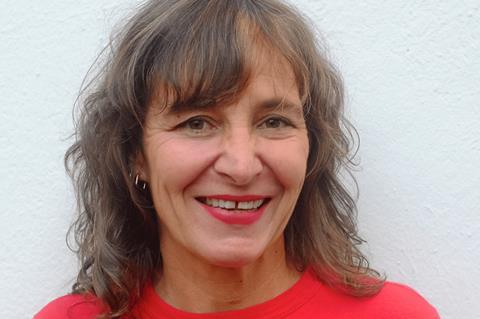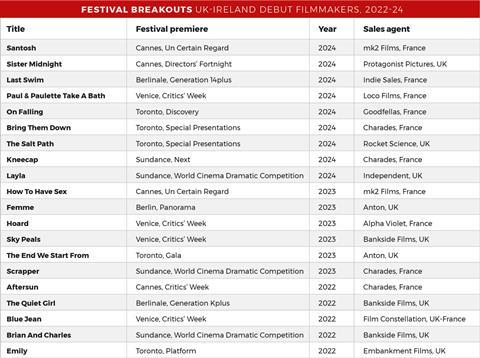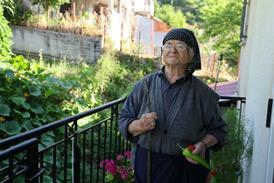
A crop of exciting films by rising UK auteurs have been causing a stir on the festival circuit in recent years.
From Molly Manning Walker’s How To Have Sex, Charlotte Wells’ Aftersun and Sandhya Suri’s Santosh making a splash at Cannes, to Luna Carmoon’s Hoard winning a wave of awards at Venice Critics’ Week and Rich Peppiatt’s boisterous Sundance audience award winner Kneecap making it to the Oscar international feature race, they all have one thing in common: they are represented by French, not UK, sales agents.
Paris-based mk2 Films’ interest in UK — and Irish — talent has even led it to set up a London offshoot of the company, under the watch of former Protagonist Pictures and Upgrade Productions executive Vanessa Saal. mk2’s slate, overseen by the company’s Ireland-born and Paris-based managing director Fionnuala Jamison, includes Santosh, How To Have Sex and Darren Thornton’s BFI London Film Festival premiere Four Mothers, a UK-Ireland co-production.

France’s Charades is also a keen supporter of UK and Irish fare, selling Charlotte Regan’s Scrapper, Chris Andrews’ Bring Them Down, Sean Dunn’s The Fall Of Sir Douglas Weatherford, George Kane’s Apocalypse Clown and Kneecap. “There is the prospect of commerciality with English-language films that you can’t have with any other foreign-language title,” says Carole Baraton, co-founder of Charades.
Baraton notes that Charades is still a fairly new company, set up in 2017. Without longstanding relationships, first-time filmmakers offer “a way for us to put a foot in the door in the UK space, because we think it’s an interesting one for us”.
While Charades is not looking to follow in mk2’s footsteps and set up a UK outpost in the near future, the company has previously invested in development within the UK, working with UK distributor Curzon to back the Mother Tongues scheme, with producers Jack Tarling, Manon Ardisson and Chiara Ventura. That scheme was established to support UK features that contain dialogue not in the English language, of which Kneecap was a recipient.
French connection
The international perspective a French seller can give to a film, coupled with France’s film culture being auteur-driven, can be enticing to UK filmmakers, suggests Baraton. “When we talk to UK producers, there is something of a different cultural approach,” she says. “It’s already first feedback [on a film] from an international perspective, before it goes to the rest of the world.”
“There is a big tradition of auteur-driven cinema across French sales companies,” adds Fabien Westerhoff, founder of UK-France sales and production outfit Film Constellation. “That tradition applies to a great new wave of British auteurs, where many people are excited about working with those new voices, whereas maybe UK sales agents have traditionally been focused more on cast-driven packages.”

Film Constellation started life as a UK-based company and still employs its core team out of the UK, as well as operating in Paris. It launched a Paris-based hub in 2022. The firm has represented UK filmmaker Georgia Oakley’s debut feature Blue Jean, which premiered at the 2022 Venice Film Festival, and rising French talent such as Emma Benestan’s Cannes Critics’ Week title Animale.
“We established an office out of France in reaction to Brexit, because we wanted to continue to work in the European system, as we’ve always done,” says Paris-born Westerhoff.
Baraton agrees that Brexit is helping to drive UK filmmakers to French sellers. “I feel there has been kind of an opposition trend to Brexit from the cinema crowd, to try to co-operate more with Europe, on production and sales as well,” she notes.
Without any major sales agents, Irish films have historically turned to the UK for representation. Increasing numbers are now also turning to France. Apocalypse Clown, Bring Them Down, Kneecap and Four Mothers are all Irish-produced or co-produced titles that are being represented by French sales agents. Both French and Irish exhibitors and distributors can access Creative Europe Media support, a resource no longer open to UK companies since Brexit. Ireland and France further formalised ties by signing a co-production agreement in 2022.
French sales agents are also well looked after by their own buoyant national film ecosystem, secured by the French National Centre of Cinema (CNC). “We have more support than UK sales agencies,” says Baraton.
Support available for French sales agents from CNC includes a fund designed to help promote films abroad, based on criteria such as how a film performs at the French box office and its selection at global festivals. Also, if they are a co-producer on a film, as many French sales agents are, they receive a portion of France’s box-office ticket levy to reinvest in the production of any of their future French films.
“If the reason British films are going to overseas sales companies is because there isn’t a demand from UK sales companies, clearly there is a gap in the funding system,” observes one UK sales agent.
UK frustrations
Plenty of major UK sales companies continue to work with burgeoning UK filmmakers, such as Altitude, Anton, Bankside Films, Cornerstone Films, Embankment Films, HanWay Films and Protagonist Pictures. But not all are happy with the direction of travel.
“A big part of me feels it’s very closely tied to Cannes selection,” says one UK sales agent on why UK filmmakers are opting for French sales agents. “It is far more likely a film is going to get into Cannes with a French sales company.”
How To Have Sex, Santosh and Aftersun are all recent cases in point, while BFI Filmmaking Fund director Mia Bays recently remarked during an industry event at France’s Dinard British & Irish Film Festival that most of the BFI’s current slate sits with French sellers.
“It does pose quite significant questions, particularly for financiers on the UK side,” continues the UK seller. “It doesn’t make sense to me that publicly financed British films would be given to a non-UK entity. There is a disconnect there. Public funds, although they are going directly into production, should be kept within the UK to improve the ecosystem, so everyone can participate in the success of those films. That is a question that needs serious consideration.”
The sales agent points out that it would be unimaginable for a French title to have UK sales representation. “There is an imbalance in the way it’s working. France is a very well-supported territory in terms of public funding. Arguably it doesn’t need the UK’s public funding as well, which indirectly is happening.”
Another UK sales agent points out that the fitness of France’s sales agencies means they can be competitive in their acquisitions. “They do occasionally put up advances; they have money,” says the agent.
A system that helps the UK independent film space to feed itself and foster career-spanning relationships, advises one executive, is necessary. “The film business is hard — if we want to maintain a healthy, buoyant film industry across all sectors, it would be helpful to try to make those films stay in the UK.”


























No comments yet